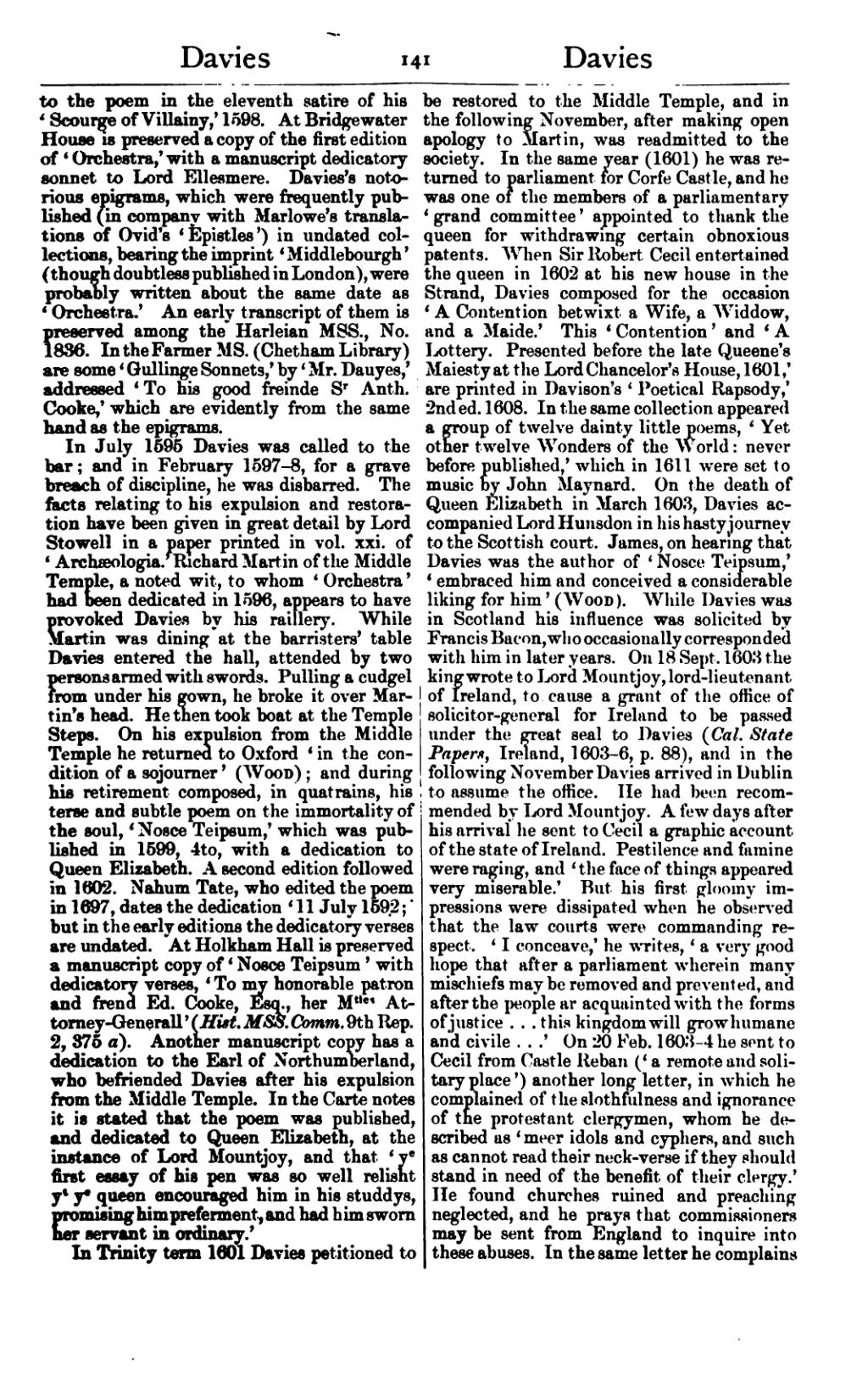to the poem in the eleventh satire of his ‘Scourge of Villainy,’ 1598. At Bridgewater House is preserved a copy of the first edition of ‘Orchestra,’ with a manuscript dedicatory sonnet to Lord Ellesmere. Davies's notorious epigrams, which were frequently published (in company with Marlowe's translations of Ovid's ‘Epistles’) in undated collections, bearing the imprint ‘Middlebourgh’ (though doubtless published in London), were probably written about the same date as ‘Orchestra.’ An early transcript of them is preserved among the Harleian MSS., No. 1836. In the Farmer MS. (Chetham Library) are some ‘Gullinge Sonnets,’ by ‘Mr. Dauyes,’ addressed ‘To his good freinde Sr Anth. Cooke,’ which are evidently from the same hand as the epigrams.
In July 1595 Davies was called to the bar; and in February 1597–8, for a grave breach of discipline, he was disbarred. The facts relating to his expulsion and restoration have been given in great detail by Lord Stowell in a paper printed in vol. xxi. of ‘Archæologia.’ Richard Martin of the Middle Temple, a noted wit, to whom ‘Orchestra’ had been dedicated in 1596, appears to have provoked Davies by his raillery. While Martin was dining at the barristers' table Davies entered the hall, attended by two persons armed with swords. Pulling a cudgel from under his gown, he broke it over Martin's head. He then took boat at the Temple Steps. On his expulsion from the Middle Temple he returned to Oxford ‘in the condition of a sojourner’ (Wood); and during his retirement composed, in quatrains, his terse and subtle poem on the immortality of the soul, ‘Nosce Teipsum,’ which was published in 1599, 4to, with a dedication to Queen Elizabeth. A second edition followed in 1602. Nahum Tate, who edited the poem in 1697, dates the dedication ‘11 July 1592;’ but in the early editions the dedicatory verses are undated. At Holkham Hall is preserved a manuscript copy of ‘Nosce Teipsum’ with dedicatory verses, ‘To my honorable patron and frend Ed. Cooke, Esq., her Mties Attorney-Generall’ (Hist. MSS. Comm. 9th Rep. 2, 375 a). Another manuscript copy has a dedication to the Earl of Northumberland, who befriended Davies after his expulsion from the Middle Temple. In the Carte notes it is stated that the poem was published, and dedicated to Queen Elizabeth, at the instance of Lord Mountjoy, and that ‘ye first essay of his pen was so well relisht yt ye queen encouraged him in his studdys, promising him preferment, and had him sworn her servant in ordinary.’
In Trinity term 1601 Davies petitioned to be restored to the Middle Temple, and in the following November, after making open apology to Martin, was readmitted to the society. In the same year (1601) he was returned to parliament for Corfe Castle, and he was one of the members of a parliamentary ‘grand committee’ appointed to thank the queen for withdrawing certain obnoxious patents. When Sir Robert Cecil entertained the queen in 1602 at his new house in the Strand, Davies composed for the occasion ‘A Contention betwixt a Wife, a Widdow, and a Maide.’ This ‘Contention’ and ‘A Lottery. Presented before the late Queene's Maiesty at the Lord Chancelor's House, 1601,’ are printed in Davison's ‘Poetical Rapsody,’ 2nd ed. 1608. In the same collection appeared a group of twelve dainty little poems, ‘Yet other twelve Wonders of the World: never before published,’ which in 1611 were set to music by John Maynard. On the death of Queen Elizabeth in March 1603, Davies accompanied Lord Hunsdon in his hasty journey to the Scottish court. James, on hearing that Davies was the author of ‘Nosce Teipsum,’ ‘embraced him and conceived a considerable liking for him’ (WOOD). While Davies was in Scotland his influence was solicited by Francis Bacon, who occasionally corresponded with him in later years. On 18 Sept. 1603 the king wrote to Lord Mountjoy, lord-lieutenant of Ireland, to cause a grant of the office of solicitor-general for Ireland to be passed under the great seal to Davies (Cal. State Papers, Ireland, 1603–6, p. 88), and in the following November Davies arrived in Dublin to assume the office. He had been recommended by Lord Mountjoy. A few days after his arrival he sent to Cecil a graphic account of the state of Ireland. Pestilence and famine were raging, and ‘the face of things appeared very miserable.’ But his first gloomy impressions were dissipated when he observed that the law courts were commanding respect. ‘I conceave,’ he writes, ‘a very good hope that after a parliament wherein many mischiefs may be removed and prevented, and after the people ar acquainted with the forms of justice … this kingdom will grow humane and civile …’ On 20 Feb. 1603–4 he sent to Cecil from Castle Reban (‘a remote and solitary place’) another long letter, in which he complained of the slothfulness and ignorance of the protestant clergymen, whom he described as ‘meer idols and cyphers, and such as cannot read their neck-verse if they should stand in need of the benefit of their clergy.’ He found churches ruined and preaching neglected, and he prays that commissioners may be sent from England to inquire into these abuses. In the same letter he complains

